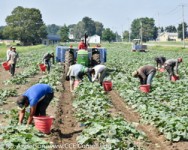2025 Year in Review
Our 2025 Year in Review and 2026 Preview report highlights some of the many research and educational programs led by our team in 2025. Plus, we provide a sneak peek at some of our plans for 2026!
- Integrating Laser Weeders into Muck Onion Production
- Cornell Vegetable Program Advances Cover Crop Research
- New, Interactive Pesticide Safety Programming Protects Farmer Health
- Specialty Potato Variety Trial Tests Varieties During a Hot Growing Season
- Mushroom Enthusiasm Grows
- Equipping Sweet Corn Growers for an Emerging Disease: Tar Spot
- Farm Food Safety Educational Outreach
- Sustainable Pest Management for New York Urban Farmers
- In 2026...
Cornell Crop and Pest Management Guidelines Paused
From Cornell IPM:
Highlighting its commitment to quality and long-term sustainability, Cornell Integrated Pest Management's Pesticide Safety Education Program has announced a pause in production of the 2026 Cornell Crop and Pest Management Guidelines.Cornell IPM Director Alejandro Calixto said this temporary measure is the result of a comprehensive reimagining process facilitated by Illume Projects of Ithaca, which included end-user interviews, internal surveys and sales data analytics.
"It became clear to us that we cannot continue producing the guidelines and fully restructure them at the same time," Calixto said. "By pausing production, we can dedicate all available resources and time to rebuilding the production process, ensuring that when we re-launch in 2027, the guidelines will reflect a modernized approach built around the grower and other user experience."
A series of annually updated reference manuals produced by Cornell IPM and the College of Agriculture and Life Sciences (CALS), the Cornell Crop and Pest Management Guidelines are widely used by farmers, agronomists, crop consultants and extension educators in New York and throughout the Northeast. They include information about current IPM recommendations, pesticide options, cultural practices, nutrient management, disease, insect and weed identification and resistance-management strategies.
Calixto and Pesticide Safety Education Program Lead Mike Helms will spearhead efforts to restructure the guideline process over the next 12 months, with a goal of launching a more streamlined, user-friendly version in 2027.
Limited copies of the 2025 guidelines remain available for purchase while supplies last through The Cornell Store. The 2026-2027 Greenhouse Guidelines will be available.
For more information contact Helms at
mjh14@cornell.edu.




































